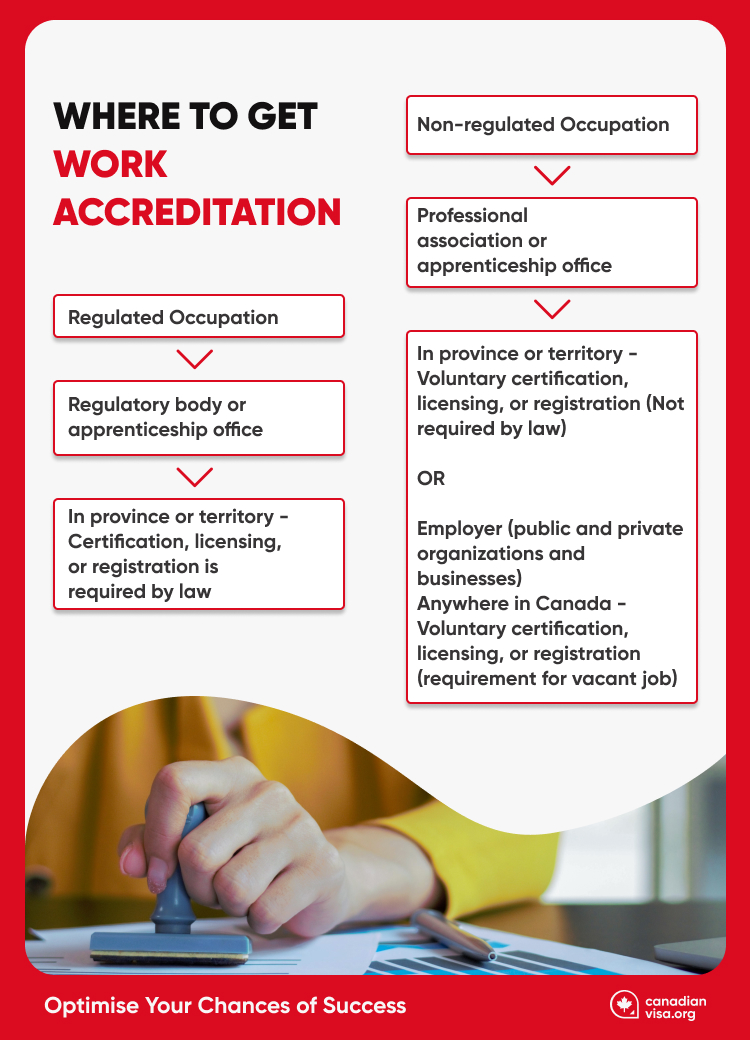Canada Immigration Accreditation and Licensing
> Library > Accreditation and Licensing
Accreditation and Licensing
Independent Applicants for Canadian permanent residence should know that many occupations in Canada require accreditation and/or licensing as a pre condition of employment. The Immigration Manual states that persons in certain occupations must meet additional criteria to meet selection criteria. These occupations are briefly described below: Immigrants in General Requiring Registration or Licensing Applicants who must be licensed in Canada to practice their profession are generally required to obtain evidence from the applicable provincial authority that they will be able to meet the licensing requirements and the immigration officers normally referred to such provincial bodies. However, the immigration officer may dispense with the referral where it is clear that the applicant's qualifications will be acceptable for licensing. An immigration officer is not required also to refer to the provincial authority in the case where it is clear that the applicant's qualifications will not be acceptable. Engineers, Engineering Technologists and Technicians Eligibility for membership in a provincial/territorial association of professional engineers or engineering technologists and technicians is the accepted criteria for determining whether an applicant (engineer, technician, or technologist) has the minimum skills necessary to practice at a professional level in Canada. The Canadian Counsel of Professional Engineers and the Canadian Counsel of Technicians and Technologists provide informal assessments which assist the visa officer in determining whether or not an applicant can be assigned an occupational coding as an engineer, engineering technologist or engineering technician. Dentists In the case of self employed applicants, where not offer of employment exists, the visa posts abroad will check with the appropriate Canadian regional office before giving approval. The regional office will consult with the provincial department of health. Pharmacists Pharmacists must demonstrate that they have passed the evaluating examination administered by the Pharmacy Examining Board of Canada. Medical Doctors Applicants who wish to be processed as medical doctors cannot apply as independent applicants unless they have arranged employment in Canada that has been certified by the Canada Employment Centre. Academics Applicants who are seeking employment as teachers at a Canadian university or college must have a validated offer of employment before their application can be approved. In certain instances the lack of Canadian accreditation will result in the refusal of an application for Canadian Permanent residence. Licensing is usually regulated by the individual provinces of Canada and requirements will vary from one province to another. While licensing may be necessary to work in a particular occupation, the lack of same will not in itself result in the refusal of an application for Canadian permanent residence. There are two main classes in which licensing may be required in Canada: trade licensing, and professional licensing. For some trade sectors (i.e., electrician, plumber) certain provinces require mandatory licensing of employees in order to establish that they have met the minimum standards that the industry has set. In the case of other trades or provinces, licensing is voluntary, but may be preferred by particular employers or trade unions. Most professional occupations (i.e., Chartered Accountants, Nurses) place certain licensing requirements on their members as well. An individual can find out the professional licensing requirements of specific occupations by: contacting the organization which administers the licensing policies in the area the individual wishes to be employed in. contacting a relevant department within a University in the area the individual wishes to become employed. contact a professional in the area the individual wishes to become employed. Professional licensing usually requires the candidate to achieve a specific level of education; an adequate level of occupational training; successfully complete certain form of examination; and, sometimes, demonstrate fluency in one or both of Canada's official languages. It should be clear to applicants, especially with regard to occupations where licensing or certification is mandatory, that a positive informal assessment is not a guarantee of a license, and that, in most cases, the assessing body is a professional association, not the actual authority empowered by provincial or federal law to issue a license or certificate. In addition, most Canadian professional and trades licensing bodies operate at the provincial, not the national level, and that standards vary from province to province.
Canada Immigration Law | Who We Are | Services | Immigration | Employment | Retain Us | Archive | Links | Navigation
Business Profile | Professional Credentials | Client References | Contact Information | Index of Topics | Search

